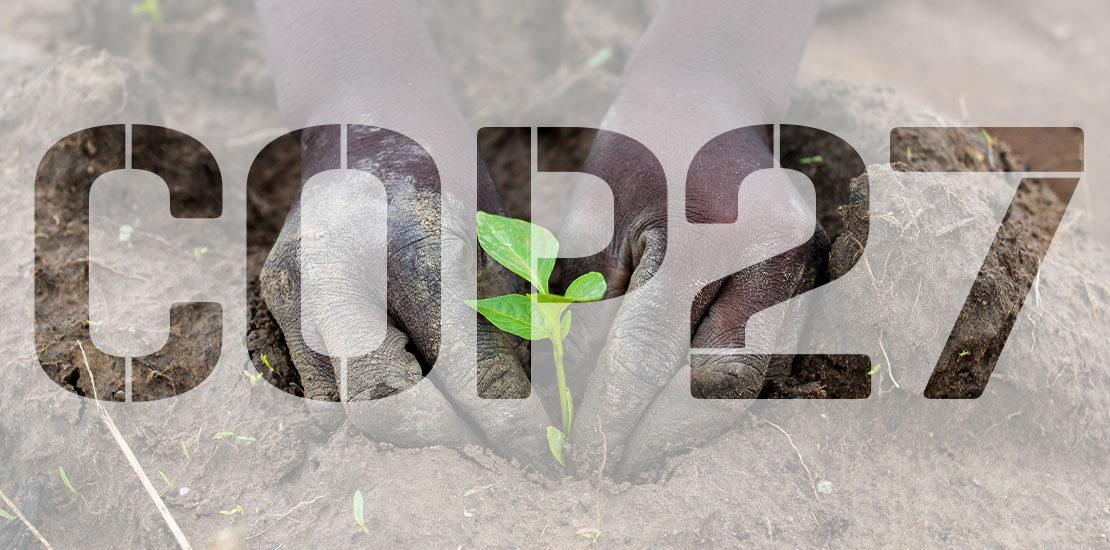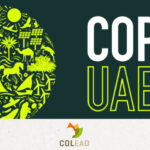COP 27: our future is in the hands of the agricultural and food industry
- 15/11/2022
- Posted by: Gaetan Dermien
- Category: ACP EN, News

Over the past decades, agriculture has continuously expanded and enhanced its productivity to ensure food security and food safety to the growing global population in an unsustainable way. This has led to the loss of natural ecosystems, declining biodiversity and increasing greenhouse gas emissions1. The global agrifood system, which includes food production, processing, packaging and transport, is responsible for one of the largest shares of greenhouse gas emissions2 and thus is an important contributor to climate change. However, promoting more sustainable agriculture and food systems which support environmental health, economic profitability and social equity is part of the solution to the climate change problem.
Agriculture is concurrently one of the sectors most at risk from climate change. Africa3 and Caribbean4 and Pacific5 Small Island Developing States (SIDS) are disproportionately impacted despite their limited share in global greenhouse gas emissions. In the most vulnerable communities, the impacts of climate change pose a direct threat to people’s very survival. Increases in temperature, sea level rise and extreme weather events such as drought, flooding and violent storms all have an impact on cultivated land as well as on crop yield, soil fertility and the availability of water—the associated increases in pest pressures are also detrimental to crop production. Fisheries and aquaculture, which provide the main source of animal protein for over a billion people worldwide, are at risk due to higher sea temperatures. Storms and hurricanes can cause sea level rise and coastal erosion threatening infrastructure, settlements and facilities that support the livelihoods of island communities. However, African, Caribbean and Pacific (ACP) countries face limited institutional, economic and financial resources to address the impact of such adverse climate change on agriculture.
Political efforts to compel the agriculture sector to comply with global commitments to reduce greenhouse gas emissions – e.g. the Paris Climate Change Agreement – have therefore been limited. In 1992, the United Nations decided to coordinate their actions to prevent [rising] greenhouse gas levels in the atmosphere due to human activity from affecting the climate system by signing the United Nations Framework Convention on Climate Change (UNFCCC). Since 1995, the signatories of the UNFCCC meet annually at the so-called Conferences of the Parties to the UNFCCC (COPs) to assess the ongoing process and negotiate the taking of further actions. The Koronivia Joint Work on Agriculture (KJWA), established in 2017 at COP23, is the only programme under the UNFCCC that focuses specifically on agriculture and food security. If globally agriculture is responsible for a third of all greenhouse gas emissions6, it is also part of the solution to the climate change debate.
COP27 hosted by Egypt in Sharm El-Sheikh from the 6 to 18 November 2022 will discuss the importance of agriculture and food systems in light of “Climate Justice” and mitigating the effects of climate change and adapting to them, especially on 12 November which has been declared Adaptation & Agriculture Day. Food systems must be addressed in a comprehensive way, supporting agriculture to feed a growing population but also supporting social and environmental aspects. Our future lies in the hands of the farmers.
Agriculture remains a vital sector for most developing countries in terms of economic development, employment and trade. Private sector operators, MSMEs and smallholders all have a key role to play in promoting sustainable production, using climate-resilient crops and supporting both green growth and the circular economy. These actors need market incentives, strong institutions and supportive policies to start, grow and upscale their operations. To meet the climate change and environmental challenge, priorities for ACP countries include: enhancing environmental services, making more efficient use of scarce natural resources such as land and water, promoting renewable sources of energy, upscaling innovations and leveraging a green agenda for new jobs and sources of income for the poor.
COLEACP supports producers, entrepreneurs, consultants, technicians and all stakeholders in the agricultural and food systems to enhance food security and nutrition, efficiently use natural resources and mitigate climate change by providing continuous capacity building, training and technical assistance. COLEACP also focuses on promoting the contribution of smallholders, SMEs, and farmer groups and organisations to a sustainable agrifood sector, by sharing best practices during online sessions. For example, innovative and resilient African and Caribbean entrepreneurs spoke about how they have adapted their business models in light of the constraints and challenges arising from climate change in Innovations Sessions and Caribbean Agrifood Business Sessions co-organised with the Pan-African Farmers’ Organization (PAFO) and the Inter-American Institute for Cooperation on Agriculture (IICA), respectively.
Agribusiness practitioners and scientific research are the nexus between health, nutrition and climate change. The transformation of agricultural and food systems through the adoption of agroecological practices is key to tackle and cope with the challenges linked to climate change. Scientific research and the cooperation of the private sector are essential to the development of Climate-Smart Agriculture (CSA). COLEACP, as the lead of the second service area of the European Union (EU)-funded Development of Smart Innovation through Research in Agriculture (DeSIRA) programme, works closely with African research organisations towards the development of sustainable agriculture and food systems. DeSIRA-LIFT’s Service Area 2 supports FARA, AFAAS, ASARECA, CCARDESA and CORAF – collectively known as the CAADP-XP4 organisations – playing a key role in Africa’s Agricultural Knowledge and Innovation Systems (AKIS). At COP27, the African Union Commission is organising a high-level ministerial roundtable on the African Union Green Recovery Action Plan (GRAP) 2021–2027 that was adopted by the AU Assembly in February 2022, to discuss its operation and funding. DeSIRA-LIFT is supporting this effort.
Sustainable intensification is at the heart of COLEACP programmes such as FFM+, financed by the EU and the Organisation of African, Caribbean and Pacific States (OACPS). FFM+ is framed around a sustainability charter, a sustainability self-assessment system, and associated capacity building. The aim is to improve production and contribute positively to climate, ecosystems and the productive environment, while minimising any negative impacts by addressing the three pillars of sustainability towards achieving the Sustainable Development Goals (SDGs).
1 IPCC, 2019. Climate Change and Land: Summary for Policymakers.
2 In 2019, global agri-food system emissions corresponded to 31% of total anthropogenic emissions. Tubiello, F.N., Karl, K., Flammini, A. et al., 2022. Pre- and post-production processes increasingly dominate greenhouse gas emissions from agri-food systems.
3 Climate Change in Africa, African Development Bank Group, accessed on 08.11.2022.
4 Building Resilience to Climate Change in Small Island Developing States, Inter-American Development Bank, accessed on 08.11.2022.
5 The Pacific Islands: The front line in the battle against climate change, National Science Foundation, accessed on 10.11.2022.
6 Crippa, M., Solazzo, E., Guizzardi, D., et al., 2021. Food systems are responsible for a third of global anthropogenic GHG emissions. Nature Food 2, 198–209.

